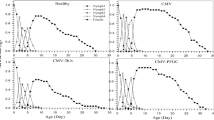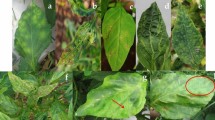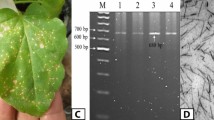Abstract
IN a previous note1, we showed that liquid crystalline substances infective at high dilutions could be isolated from solanaceous plants infected with three different strains of tobacco mosaic virus. We have been unable to transmit these strains to cucumber plants, and other workers have found cucumber to be immune to tobacco mosaic virus. From cucumber plants infected with cucumber viruses 3 and 42, we have now isolated nucleoproteins with a similar chemical composition and similar in many of their properties to those obtained from solanaceous plants infected with tobacco mosaic virus ; they are, however, rather less stable and more difficult to isolate.
This is a preview of subscription content, access via your institution
Access options
Subscribe to this journal
Receive 51 print issues and online access
$199.00 per year
only $3.90 per issue
Buy this article
- Purchase on SpringerLink
- Instant access to full article PDF
Prices may be subject to local taxes which are calculated during checkout
Similar content being viewed by others
References
Bawden, F. C., Pirie, N. W., Bernal, J. D., and Fankuchcn, I., NATURE, 138, 1051 (1936).
Ainsworth, G. C., Ann. Appl Biol., 22, 55 (1935).
Author information
Authors and Affiliations
Rights and permissions
About this article
Cite this article
BAWDEN, F., PIRIE, N. Liquid Crystalline Preparations of Cucumber Viruses 3 and 4. Nature 139, 546–547 (1937). https://doi.org/10.1038/139546b0
Issue date:
DOI: https://doi.org/10.1038/139546b0
This article is cited by
-
Virusziekten van de komkommer in Nederland
Tijdschrift Over Plantenziekten (1959)
-
Nieuwe Inzichten In Den Aard Der Voor Planten Pathogene Viren
Tijdschrift Over Plantenziekten (1939)
-
Das Virusproblem vom chemischen Gesichtspunkt aus
Kolloid-Zeitschrift (1938)
-
Aggregation pf Virus Particles
Nature (1937)
-
Structure Types of Protein Crystals from Virus-infected Plants
Nature (1937)



